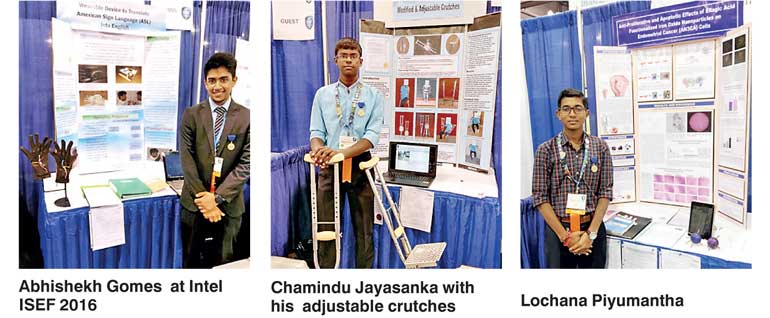Wednesday Feb 18, 2026
Wednesday Feb 18, 2026
Saturday, 14 May 2016 00:00 - - {{hitsCtrl.values.hits}}

By Hiyal Biyagamage in Phoenix, Arizona
Three finalists from Sri Lanka are highly positive of winning awards at this year’s Intel International Science and Engineering Fair (ISEF) currently taking place in in Phoenix, Arizona.
According to students, judges have praised their solutions by giving them high remarks for their innovativeness and on the public visitation day, Daily FT saw a number of visitors praising the practicality and ease of usability of these solutions.
Daily FT had the chance to speak with Chamindu Jayasanka from Hanwella Rajasinghe Central College, Abishek Stenush Gomes from Belvoir College International, Colombo and P.M. Lochana Piyumantha from Madampe Senanayake Central College and they shared their experience about coming to USA and facing international judges for the first time.
Chamindu’s ‘Modified and Adjustable Crutches’ comes with a specially-designed seat attached to the crutches which can be used by disabled people to sit whenever they feel uncomfortable after standing for a long time. The seat can sustain a weight of 100 kilograms. The pair of crutches is also height adjustable so that disabled people will not have to strain their entire body weight on the crutches to sit on a chair or a commode.
Chamindu told Daily FT: “I have no words to actually describe the magnitude of this event. It is an amazing event. Judges were positive about my pair of crutches and what they really liked about it was its practicality. Every day, we see people who are using crutches and I really felt the difficulties they are facing, especially when it comes to sitting somewhere when they feel tired. I explained these difficulties and showed the judges how my modified crutches could ease their lives. They praised it and I feel very confident of a win now.”
Abishekh is also feeling confident after he got great responses from both judges and visitors for his wearable device. It is a glove with flex sensors and a custom-made circuit board which can convert American Sign Language (ASL) into English.
“I saw a huge communication gap between people who are using sign language and non-communicators of ASL. My glove which acts as a wearable device will prevent the widening of this communication gap because it provides the capability for speech-impaired people to communicate with us,” Abhishekh told Daily FT.
His custom-made circuit board has an Integrated Circuit (IC) with predefined letters and words which allows automated translation. When a user operates his device, finger placements of the user will be identified and match with the predefined values. If they match, data will be transmitted and displayed wirelessly onto a smartphone application. His effort has got the nod of approval from the judges and many visitors gave him full credit for what he has come up with.
Lochana has found a nanotechnology-based solution for resistant endometrial cancer cells. It is a type of cancer that begins in the lining of the womb. In his solution, he has used Ellagic acid in berries and iron oxide nanoparticles which create an anti-cancer agent for endometrial cancer cells. Lochana is still in Grade 12 but he had done a number of complex studies and analysis which requires the knowledge level of a PhD student.
“No one has ever done a nano-based study to eradicate resistant endometrial cancer cells so far. A few of the judges who came to evaluate my project also confirmed that and they were amazed about how a 17-year-old student could do complex cell morphology analysis and vitro studies. They asked me lot of questions and how this solution could be further developed into something more commercial and viable. I guess I have a long way to go in order to make this more commercial. Intel ISEF has given me the chance to show this to the world and I am really happy about the reaction I got from the judges,” said Lochana.
Approximately 1,750 young scientists, makers and entrepreneurs from around the world have gathered here this time to compete for $ 4 million in awards and scholarships at Intel ISEF, the world’s largest high school science research competition. Finalists’ projects tackle topics ranging from wearable technology to big data analytics to renewable energy. Projects represent a wide range of scientific disciplines and are judged in 22 categories.
The top research project in the competition will receive the Gordon E. Moore Award – a $ 75,000 grand prize from the Intel Foundation, given in honour of the Intel co-founder and scientist. Two additional research projects will receive Intel Foundation Young Scientist Awards of $ 50,000. Additional prizes, funded by the Intel Foundation with support from dozens of corporate, academic, government and science-focused sponsors, will be awarded to approximately 600 other projects.